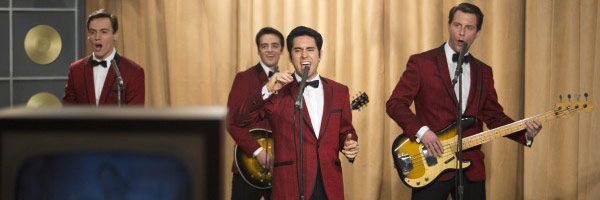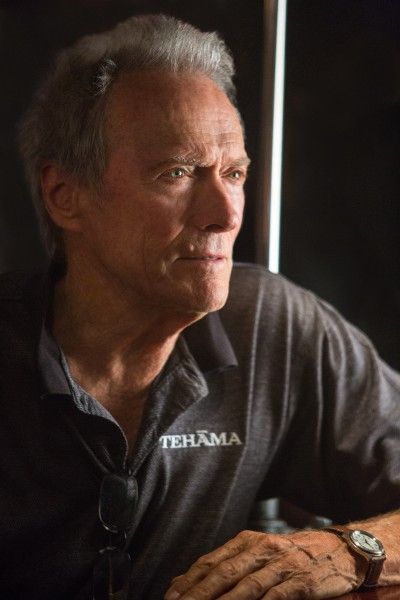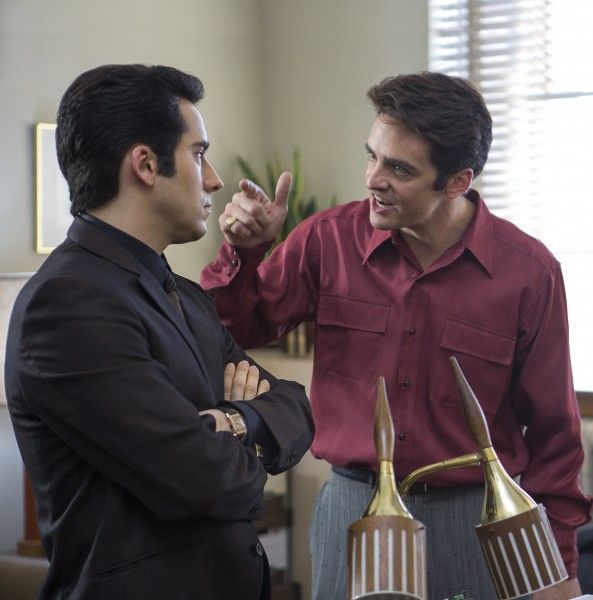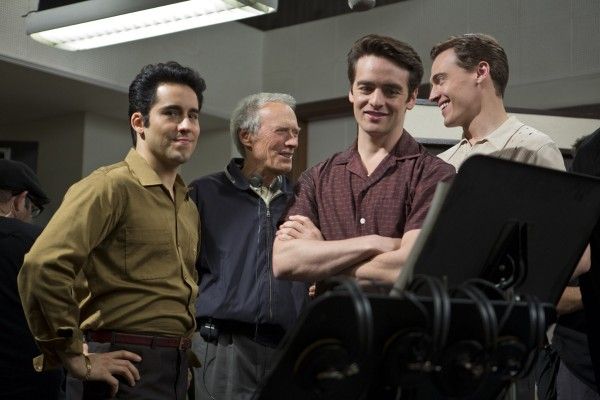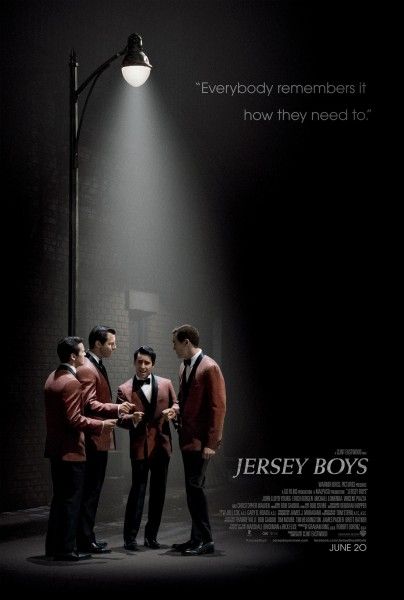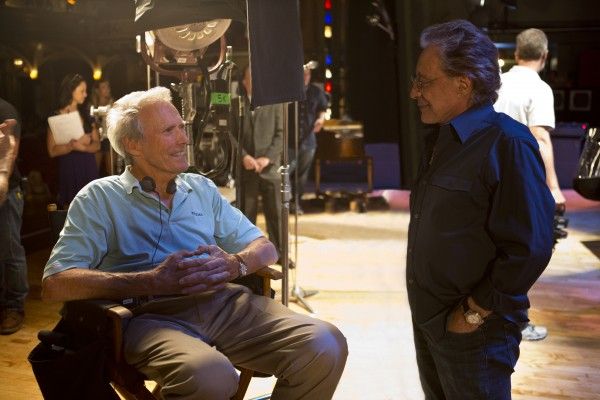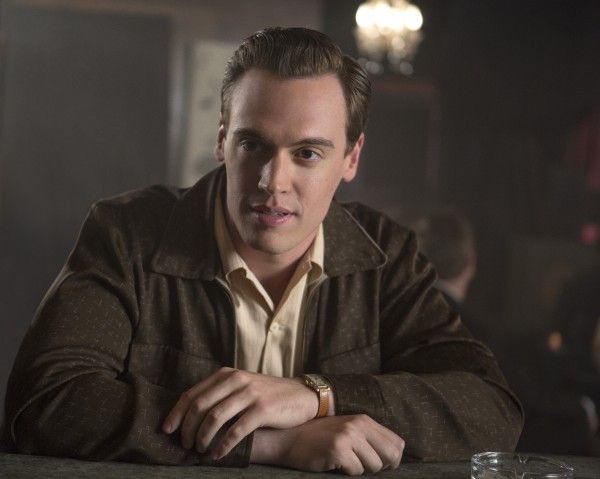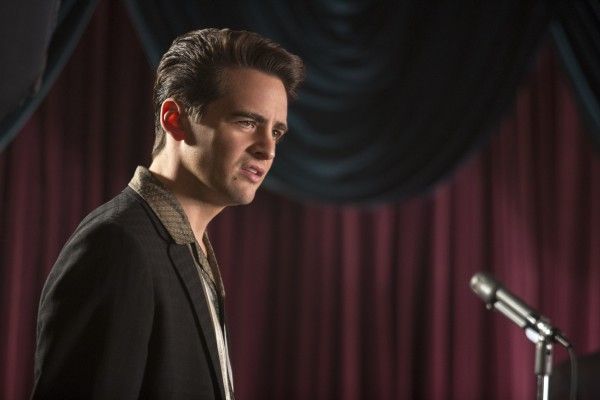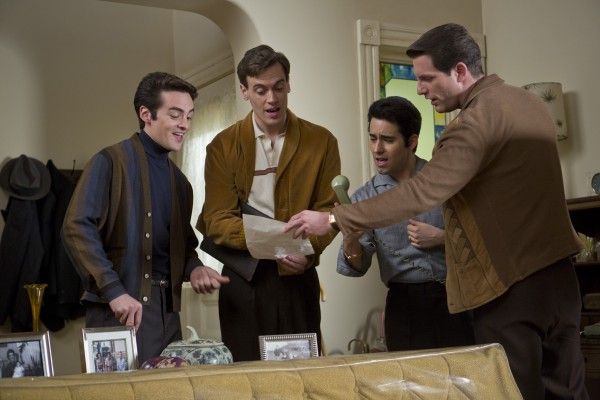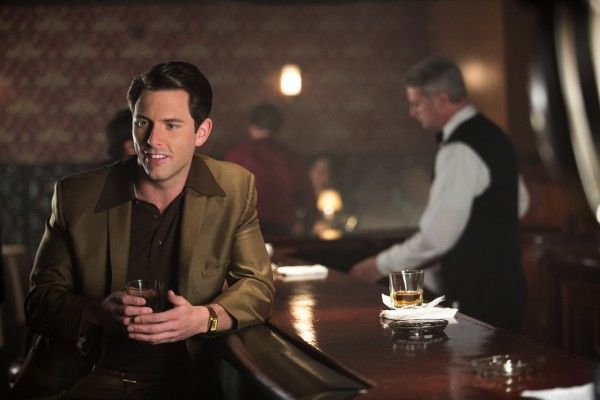Now playing in theaters is director Clint Eastwood’s Jersey Boys. The film, which is based on the extremely popular stage musical, tells the story of Frankie Valli and The Four Seasons, chronicling the group’s rise in the 1960s with such hits as “Sherry,” “Big Girls Don’t Cry” and “Walk Like a Man” and subsequent troubles that came with their success. The film stars John Lloyd Young, Vincent Piazza, Erich Bergen, Michael Lomenda, Renee Marino, Mike Doyle, and Christopher Walken. For more on the film, watch the trailer or these clips.
At the New York City press day, I was able to participate in a press conference with Clint Eastwood, John Lloyd Young, Erich Bergen, Michael Lomenda, Vincent Piazza, and screenwriters Marshall Brickman and Rick Elice. They talked about making the film, how Eastwood got involved, the challenges in bringing the stage musical to life, the clever director cameo, what it was like for the cast to meet Eastwood for the first time, and a lot more. Hit the jump for what they had to say.
Question: Mr. Eastwood, how in the world did you decide to Jersey Boys?
CLINT EASTWOOD: It seemed like something to do. It’s funny, I hadn’t seen the play but I'd heard a lot about it over the years. Somebody said, "Would you be interested?" And I said I’d be interested in looking at it. They sent me the script which was by a very good writer. I found out later that wasn’t the script of the play. I asked where I could find the script of the play. A friend of mine said, "I represent the guys who did that, Mr. Elice and Mr. Brickman." So I said, maybe I'd better look at that. I figured only in Hollywood would somebody give you a script on something else when they have a script that’s a hit. I looked at that and I liked it very much. Then i went and saw three different version of the play in New York, San Francisco and Las Vegas and saw all these wonderful actors and that was that.
Were you a fan of this music, and did you ever meet Frankie Valli?
EASTWOOD: I met Frankie Valli years ago in passing. I was never a fan of music of that particular era because I came along before all that. But I liked the Four Seasons a lot. I thought their music was far superior. I think "Can’t Take My Eyes Off of You" is one of the real classic songs of that era and would have been a classic song any time in history. All of their stuff was very energetic music and great fun. It was a pleasant challenge to do it and work with the actors who had great influence on the play on its run throughout the country. It was great to be using the original people
I noticed that there were certain socioeconomic factors that were occurring in Belleville, New Jersey at the time, as far as kids from the street trying to make it in music. Did that affect the way that you thought about the roles?
VINCENT PIAZZA: In terms of Tommy DeVito, I felt that it was certainly something to pay attention to in the work. Certain stigmas at the time about Italian American and transcending the borough or pocket community they’re from. It fueled a fire within these guys to get out, to make it. At least it was alive within me, and hopefully apparent in some of the work, in some of the scenes.
JOHN LLOYD YOUNG: There's a famous line Tommy says, "There were three ways out. You got mobbed up, you got in the army or you became a superstar." The movie adds a little twist to that, "For us it was two out of three." I think that there's a desperation to get up and out. What I learned from these characters is that they both have ego. Franki has ambition and talent but might not necessarily know how to get it out there. Tommy knows how to break walls down and get things out.
I understand you went into this right as the Beyonce version of A Star Is Born wasn't going to happen. What did you think was the biggest challenge where you have time passing, famous songs, and actors speaking directly to the camera?
EASTWOOD: I’m trying to think of the chronology of how this all came about. I had been entertaining the idea of doing a remake of A Star is Born, of which I was a fan of the movie with Fredric March and Janet Gaynor. I thought it'd be interesting to do that from a modern day standpoint. When this came along, I went to the head of the studio. The studio had been flirting with doing this project but they had passed on it. I was having lunch with the head of the studio and asked, "Why would you pass on that? It’s such a popular play, there must be something there." He called me a short time later and said, "Would you entertain doing this? It looks like we’re coming back into it. Would you do this and set the other one aside?" And I said, "Yeah, I would." This was a lot more ready to go than the other project, which is still not completed writing-wise.
What about the challenges you saw bringing this to the screen from the stage?
EASTWOOD: I didn't think it was too much of a challenge. You can open it up. It's a wonderful play and had a lot of excitement in it, but I could approach it from a more realistic angle. There's a lot of things you can do in a movie that you can't do on stage. They have to keep things moving and be very practical. I just tried to open it up and give it a certain realism maybe.
Marshall and Rick, did you see challenges in putting this on the big screen?
MARSHALL BRICKMAN: They’re two different media, really. As Clint said, there are things that you can't do on stage and things that you can do in a movie. What we tried to do with the screenplay was deepen it a little bit. A two-and-a-half minute song on stage will hold an audience. There’s something mystical and wonderful about being in the room with the actual live performer s on stage that works. In film, it doesn't work so you’re dependent on a great director to keep the thing moving along. To compare the movie and the stage play, the music and story on stage have equal weight. What Clint did and was a brilliant solution was to put the story a little more in front because the story is really everything.
RICK ELICE: Music in the theater functions as a close up. When a character sings in the theater, a spotlight gets you to look exactly where the director wants you to look and the character opens his soul. But because you're watching from a distance, we do it through music. In film you can actually push into a close-up and that’s why Clint was so clever to bring the story more to the front than the music. It will always be a story about music, a story about four guys who made music and made music that speaks to a whole lot of people. With the advantage of cinema and what that brings to storytelling, we were able to shift the balance.
Clint, we have four very different stories about four very different people. What was the characteristic about each of the Four Seasons to which you most relate?
EASTWOOD: I tried to relate to the whole thing. I grew up in a neighborhood that… I went to school that was half Italian Americans in quite an interesting era in Oakland, California. So I thought I understood something about that community. I had a lot of friends in that community. We used to call each other the names like dago. When Dinah Washington came out with "What a Difference a Day Makes," we were going around, "What a difference a dago makes." It was a friendly and fun era. But you had a big understanding about the closeness of the Italian American community.
There was a little bit touched on here. That you don’t forgive a lot of things. There are certain idiosyncracies, maybe clichés, maybe not, in the Italian community. You get on the bad side and you’re on the bad side forever. I don’t know if that’s true nowadays but there is a historical feeling about that. I related to it. I don’t know why, I related to it because of the people I knew in Oakland at that time, the friends I had. Then going over to New Jersey where Tommy De Vito has a street named after him. There is a culture thing going on with those guys still, because of the play. I'm sure that's why they do that. There’s no street named after me.
There is a clever director cameo in the film that reminds us that you were a similar age to the men in the film. These are young guys trying to make their mark in entertainment industry. Were there things in the story that resonated with you in their struggle that was similar to your own?
EASTWOOD: You talking about my Hitchcock moment? That was actually Erich’s suggestion. We were talking about a scene where he’s going to be sitting there watching television. He says, "I’ll be sitting there watching Rawhde." And I started thinking, "Yeah, it could be." After all, that was the right era, about the right timing. Then I put it out of my mind. Then somebody who works for me, who handles all our television stuff went ahead and did it. Afterwards I said, "Okay, I’ll live with that."
It was about the same time. That was 1959-60. That was my first break after years of doing bit parts and unappealing roles. It was a chance to gain experience and spend five or six years working with various directors before Sergio [Leone] and [Don] Siegel and all those guys.
Vincent, John Lloyd, Eric, and Michael: You must have a good story about when you met Mr. Eastwood for the first time.
MICHAEL LOMENDA: I had been touring with first national tour of Jersey Boys and we were coming to the end of the tour. It was about a year and a half, about two weeks towards the end of the run, and Mr. Eastwood showed up in the lobby one day unannounced, and I didn’t believe it was true. It wasn't until I was in my second act break when I was sitting in my dressing room in my underwear. I got a text of a picture of Mr. Eastwood in the lobby, and that's when it became true. Frankly, at the time, I thought the movie had been cast. As a Canadian with minimal film and TV experience it was off my radar. I gladly met him afterward and didn't expect to get a call about three weeks later to audition in New York. I flew down to New York that morning and it was pouring rain. I stood in Columbus Circle trying to catch a cab for about 45 minutes and was soaked from head to toe. I arrived to my audition after $140 cab ride. In that cab ride I was sitting there soaked, thinking, "I should just get out of this cab. This isn't working out. I should just go."
Something, thankfully, stopped me and said, "No, you should go, you should really go." Finally, after being about a half hour late, I looked at myself in the mirror in the bathroom and said, "You got this. You have 1200 performances under your belt. You can go in there and at least you should feel confident in that." And I did. I'm so grateful for it because about a month after that I got a call that I had booked the film. I officially met Mr. Eastwood after a six-hour fitting in LA. We sat around the room and talked about the show and all the different wonderful aspects of it. Also, incidentally, he filmed part of Unforgiven on my uncle's land. Go figure. Really coming full circle in so many ways.
ERICH BERGEN: I hadn’t done the show in about three or four years. It was one of those things where I heard and I thought, "Well, I hope they make a good movie and I'll buy tickets along with the rest of us." The first time the movie came around it was set up with a different studio and a different director. I auditioned for it. About a week after my audition, the casting director called my agent and said, "He's not really right for the role." . . . Which I’d played for three years. So I'm glad that version didn't happen. Then it ended up in the proper hands with the right writers and the right team for this. It was one audition, no callback. About a month later I was at the gym on 74th street and got the phone call and though, "Okay, I've worked out enough today." I didn’t meet [Eastwood] until we were in rehearsal studio in LA working on "Walk Like a Man." The four of us were looking in the mirror practicing choreography. And all of a sudden, in the mirror we see Clint walking behind us. We think, "Should we stop? Should we say hello?" There was no formal meet and greet. It was work from the get go and very casual. That was it. I don’t remember much of this whole thing. It was a bit of a blur.
YOUNG: I had been in the original cast of Jersey Boys, and had been away from the show for several years, then invited back to do the role again in 2012-13 on Broadway. During that return to the stage I caught wind Mr. Eastwood had been attached to the movie and was going around watching the companies around the country. I also caught wind that he was going to be interviewed by Darren Aronofsky at the Tribeca Film Festival on a Saturday afternoon. I had that Saturday afternoon free and my manager and I went and watched his interview with Darren Aronofsky. We had a hunch that maybe he might be at the matinee the next day where I was performing. In the wings, before I was about to start work, we heard that there was a standing ovation in the audience because they had seen Clint Eastwood walk in. So I knew that he was going to be there. It was a joyful performance because I felt, no matter what would happen with the movie, how great it was for [Eastwood], who has dominion in his world in Hollywood to see me in this one thing in my life so far I know I have dominion over, which is this role, in this show, in this production on stage. Afterward, I met him on stage, said some hellos, and that I enjoyed his interview with Darren Aronofsky. The next time I saw him was a month later on his set.
PIAZZA: For me, it was somewhat similar to Erich’s description in the dance studio. For awhile, Mr. Eastwood was the man behind the curtain because I was cast on the project without meeting him. I remember 30-40 days into choreography---basically, eight men were trying to teach me how to dance. Mr. Eastwood walks in. I turn, shake his hand, and two days later we were shooting the film.
How do you approach movies that are about music?
EASTWOOD: I’ve done movies on country music, jazz, and pop music. I like music of all kinds. I just immerse myself in it. I love to films about musicians, or in this case singers. This one was easy because the guys were easy. I got a standing ovation for actually going to the men’s room when I was at the Broadway show. I thought, "That's the first time and probably the last time that will ever happen." I enjoyed the play so much. By that time, I had cast Michael from the San Francisco one. Erich, I partly have to attribute to Bob Gaudio. I asked, "Of all the people who have played you, who do you think was the best?" Vince, I had never seen Boardwalk Empire at that particular time. He did come in to audition and he was spectacular in the audition. I said, "Okay, I think we've got the guys here." John Lloyd, by that time I had seen three plays, a lot of good actors in all of them. But it seemed like the group came together so well. Like Michael was saying, 1200 performances, that’s experience you just cannot buy. I was worried about Vince because he was starting from scratch, but he fit right in right away. I was just lucky. Casting a film is to me one of the most important things next to the writing. If you cast it properly everything takes place very easily. If you cast it improperly you’re fighting an uphill battle. We do spend a lot of time on casting to make sure you get the right people.
This movie represents the enduring quality of good work done well. Does this movie inspire you to make better choices on the other side of it?
PIAZZA: Any time you get a chance to play a great role, I consider all the qualities I may or may not have attributed to that character and how I would fit into the story. The decisions I make after a project like this or several projects prior to this, I try and be thoughtful about what it says in the bigger picture. I feel like a gift of working on a project like this affords me the opportunity to be picky. I will keep that in mind in the coming months.
YOUNG: I think it’s so great to have been able to play a guy who is still out there performing at 80 years old, Frankie Valli. And to get to know him over the years. The first thing that he ever told me, before we even opened the original production on Broadway, I talked to him after a rehearsal. He said to me, talking about the business, "They’ll tell you no but they can never get at this." [Young points to his heart.] In any creative career there are ups and downs. During the downs I always remember what Frankie Valli said. There’s always tomorrow and there's always a new audience and there's always a new project. I am so happy that this new project was the movie of Jersey Boys.
BERGEN: I think especially as an actor in the theater, you're always prepared to work at Starbucks tomorrow. I mean that. I know it sounds funny, but you are. I can guarantee you that half the people in Broadway shows right now—who are up for Tony awards tonight—just want to make sure their shows stay open through next weekend. Then their paycheck stops. I think primarily as an actor who works in the theater, that’s where we live. It’s comfortable being scared of your next job. To get a call like this was overwhelming. I just had to get to work, I couldn’t really take it in. What I learned from this whole experience, especially working with Mr. Eastwood, is to cut the crap out of the rest of it. All the other stuff that comes along with show business and potential fame and all this stuff. You walk onto a Clint Eastwood set, there’s no ego there. The respect for everyone from the actors to the catering truck. That ego-free nature of that set for everyone involved teaches me a lot. If you have the talent, then everything else is BS. I take that moving forward.
LOMENDA: I totally agree. I honestly think I’ll spend the rest of my life trying to chase the experience I had on that set. It was the most ideal environment to dive in and play and have fun. That speaks to Mr. Eastwood's respect and the fact that he's an actor first and he creates that environment, because I think he would probably want to be in that environment working on films. I'm ultimately so grateful to have been a part of it all because it was a real gift. It has set a standard that I look forward to the challenge of trying to duplicate in the future.
We will let Mr. Eastwood have the last word. Anything you want to say now that it's all over?
EASTWOOD: You know the old saying: "I’d rather be lucky than good." I’ve been very lucky knowing these actors and watching them perform individually in different productions and seeing them altogether doing so great. At the time you go, "Okay, this is as good as it’s going to get for me." If I can get a family together like this one has been, it’s very, very lucky. I pay tribute to the writing always. The writer is a creative artist and the director is an interpretive artist and the actors are interpretive. You take zero and make it into something, that's always amazing to me. I’ve never done it myself, but I can critique it and go from there. For Mr. Brickman and Mr. Elice, I’m lucky to have the material.

